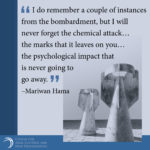Scientists Working Group member Gregory Koblentz co-authored an op-ed in The Hill about the need to hold Russia accountable for its most recent chemical weapons attack against Alexei Navalny. To uphold long-standing international norms and laws against the use of chemical weapons, Washington and its allies should impose meaningful sanctions on Moscow. Russia has repeatedly […]
Scientists Working Group Co-Founder Dies at 100
The Pandora Report is sad to report that James F. Leonard passed away recently at the age of 100. Ambassador Leonard was an ardent and articulate advocate for arms control and nonproliferation. As Assistant Director of the Arms Control and Disarmament Agency (ACDA) from 1969-1973, Ambassador Leonard was the lead U.S. negotiator for the 1972 […]
Survivor of 1988 Chemical Weapons Attack Shares His Story
Mariwan Hama was 8 years old when he was a victim of a chemical weapons attack. It was 1988, during the closing days of the Iran-Iraq War, and the Iraqi military gassed ethnic Kurdish civilians in their own country with a lethal cocktail of mustard gas, sarin and VX nerve agents in what would become […]
The pandemic risk of an accidental lab leak of enhanced flu virus: unacceptably high
Lynn Klotz, a Senior Science Fellow at the Center, published an article in the Bulletin of the Atomic Scientists about the potential risk involved in a lab accident that releases a flu virus. Why consider the risk of lab accident that releases an influenza virus into the community? Because scientists in various countries continue to […]
Hill recoils at proposed cut to Pentagon anti-pandemic effort
Scientists Working Group member Greg Koblentz was quoted in Roll Call about potential cuts to the Biological Threat Reductions Program budget. Gregory Koblentz, an associate professor at George Mason University and director of the Biodefense Graduate Program at the university’s Schar School of Policy and Government, said the Pentagon’s biological threats program increases America’s warning […]

